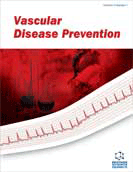Abstract
Hypertension is considered as one of the major cardiovascular risk factors for the development of atherosclerosis, a chronic inflammatory disease of the arterial vasculature. Chronic activation of the renin angiotensin system (RAS) and enhanced oxidative stress are characteristic features of both, hypertension and atherosclerosis. In fact, Angiotensin II, the effector peptide of the RAS is a central mediator of vasoconstrictor and pro-inflammatory reactions in the cardiovascular system. Many of its effects are attributed to the formation of reactive oxygen species (ROS). Thus, angiotensin II via ROS may be a central link between hypertension and atherogenesis. In this review, we will summarize the current evidence proposing angiotensin II as a critical contributor to atherosclerotic plaque vulnerability via inflammation and hemodynamic alterations.
Keywords: Angiotensin II, reactive oxygen species, hypertension, atherosclerotic plaque stability
 3
3

